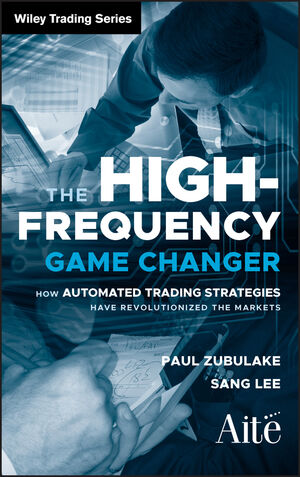The High Frequency Game Changer: How Automated Trading Strategies Have Revolutionized the MarketsISBN: 978-0-470-77038-2
Hardcover
176 pages
April 2011
 This is a Print-on-Demand title. It will be printed specifically to fill your order. Please allow an additional 10-15 days delivery time. The book is not returnable.
|
||||||
Introduction xi
Acknowledgments xiii
Chapter 1 Birth of High Frequency Trading: Equity Markets Go Electronic 1
Defining High Frequency Trading 2
Who are the High Frequency Traders? 6
Impact of High Frequency Trading 9
Building a High Frequency Trading Team 13
Chapter 2 Market Structure 15
Order Handling Rules of 1997 16
Growth of Electronic Communication Networks 17
Regulation National Market System 22
Market Fragmentation versus Competition 28
Dark Pools 32
Chapter 3 Trading Infrastructure 47
Rise of High Performance Technology Vendors 49
Key Components of High Performance Infrastructure 52
Feed Handlers 52
Ticker Plant 54
Messaging Middleware 55
Storage 58
Networking 59
Colocation 60
Sponsored Access 61
Chapter 4 Liquidity 71
HFT as Liquidity Providers 71
Flash Crash 72
Chapter 5 Trading Strategies 75
Examples of Algorithms 77
Order Types 78
Flash Orders 79
High Frequency Trading and Predatory Strategies 79
Chapter 6 Expansion in High Frequency Trading 81
Futures 81
Fixed Income 84
Foreign Exchange Market 85
Equity Options 92
Over the Counter Derivatives 94
Expansion into Global Markets 94
Chapter 7 Positives and Possibilities 105
Commoditizing High Frequency Trading 106
Trading Technology Demands and Preferences 108
Internal Focus 109
Choosing Vendors 110
Finding the Next Opportunity 111
Issues and Risks 114
Order Routing Gets Smart 115
Smart Order Routing’s Future 118
Is Artificial Intelligence Next? 121
Economic Indicators 121
News 122
Securities and Exchange Commission Filings 123
The Pseudo-Semantic Web 125
Going Global 128
The Next Wave 129
Chapter 8 Credit Crisis of 2008: The Blame Game 131
U.S. Federal Reserve 131
Regulatory Agencies 132
Credit Agencies 132
Politicians 132
End-Users of Derivative Products 133
Recent Regulatory History 134
Financial Modernization Act of 1999 134
Commodity Futures Modernization Act of 2000 134
Dodd Frank Wall Street Reform Act of 2010 135
Ending Too Big to Fail Bailouts 136
Creating Transparency and Accountability for Derivatives 137
Hedge Funds 137
Credit Rating Agencies 138
Executive Compensation and Corporate Governance 138
Impact of Potential Regulations and Rule
Changes—Securities and Exchange Commission
Concept Release 139
Chapter 9 Conclusion 141
Glossary 143
About the Authors 149
Index 151



